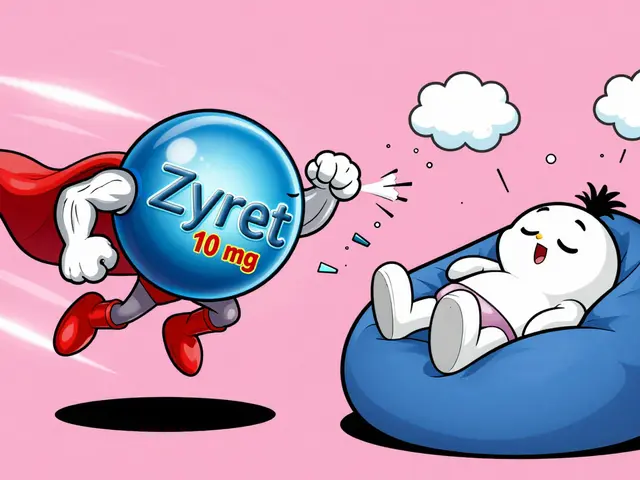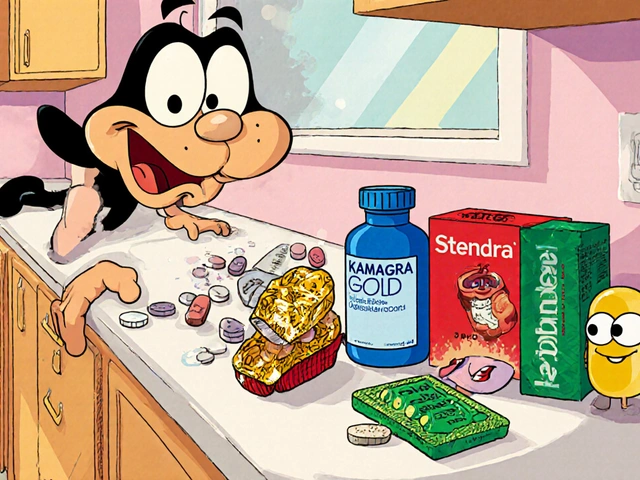Tinidazole is a medication used to tackle specific bacterial and parasitic infections. While it's pretty effective, you've got to be cautious about what you take alongside it. Some drugs just don't play well together, and that can lead to a whole mess of trouble.
First off, common over-the-counter meds or even that occasional glass of wine can mess with how tinidazole works. Yeah, sometimes even stuff that seems harmless can cause issues. Paying attention to these details can help keep you on track health-wise.
If you're on tinidazole, getting the scoop on potential interactions is vital. It might sound a bit medical-jargony, but knowing what to avoid can make or break your treatment. Easy tips, like chatting with your doc or pharmacist before mixing meds, can be a game changer.
Tinidazole Overview
Tinidazole is quite the powerhouse when it comes to fighting off certain infections. It's an antibiotic that targets both bacterial and parasitic infections. So, if you've ever had issues with something like giardiasis or trichomoniasis, there's a good chance tinidazole might be part of your treatment plan.
How does it work? Well, tinidazole zeroes in on the DNA of these pesky organisms and disrupts their cycle. It's like throwing a wrench in the gears, preventing them from multiplying and causing more trouble. This makes it less likely for the infection to spread or worsen.
How Tinidazole Is Taken
Typically, you'll take tinidazole in tablet form, usually after a meal to help reduce any stomach upset. It’s usually a short course only needing a single dose or a few days of treatment, making it a convenient choice for many.
Potential Side Effects
While tinidazole is generally well-tolerated, some folks might experience mild side effects like nausea, a metallic taste in the mouth, or a bit of dizziness. It's not super common, but keeping your healthcare provider in the loop about any unusual feelings is a smart move.
| Condition | Tinidazole Dosage |
|---|---|
| Giardiasis | 2g as a single dose |
| Trichomoniasis | 2g as a single dose |
Always remember, taking it as prescribed and not skipping doses is key to beating the infection effectively. Skipping can give the unwelcome guests a chance to bounce back, and nobody wants that!
By staying on top of your medication safety and understanding how tinidazole fits into your healthcare routine, you're more likely to get rid of those nagging infections efficiently.
Common Drug Interactions
Tinidazole is a powerhouse when it comes to fighting infections, but knowing which other drugs it interacts with is super important. The last thing you want is for combinations to backfire, right? Let's have a closer look at some interactions you should be aware of.
Alcohol
Probably the biggest no-no when taking tinidazole is alcohol. Mixing these two can cause a nasty reaction, like nausea, dizziness, or even severe headaches. So, it's a good idea to skip happy hour if you're on this medication. A cool stat to keep in mind: about 30% of people might react negatively when mixing these two.
Blood Thinners
Blood thinners, such as warfarin, are another group to watch out for. Tinidazole can amplify the effects of blood thinners, leading to increased bleeding risks. Doctors often adjust the dosage if you're taking both.
Certain Seizure Medications
Some seizure meds might also not mix well with tinidazole. Medications like phenytoin or carbamazepine could either lengthen or reduce the amount of tinidazole in your system, affecting its performance. Sounds complicated, but keeping a simple list of your meds for your healthcare provider helps a ton.
When you combine medication safety know-how with a little vigilance, you get better outcomes. If you're unsure about a new prescription fitting into your regimen, chatting up your pharmacist can be a solid move.

Tips for Safe Use
Getting the most out of tinidazole while keeping side effects to a minimum depends on how you use it. Here are some practical tips to help you stay safe.
Stay Away from Alcohol
One of the first things to know when taking tinidazole is to avoid alcohol. Mixing the two can lead to unpleasant reactions, like stomach upset or headaches. And don’t just think a glass of wine is harmless—it's not worth the risk!
Double-Check Your Meds
Always give your healthcare provider a heads-up about any other medications you're taking. There’s a chance for interactions with certain drugs, like blood thinners or epilepsy meds. Your doctor or pharmacist can help you figure out if any adjustments are needed.
Finish the Course
It’s tempting to stop taking meds when you feel better, but with antibiotics like tinidazole, finishing the entire course is crucial. Skipping doses or quitting early might not knock out the infection completely, which can lead to antibiotic resistance—a bigger headache down the road.
Hydration is Key
Keeping well-hydrated is always a good idea, especially when you're on medication. This helps your body process the drugs and can minimize certain side effects. So keep that water bottle handy!
Adverse Effects? Talk to Your Doc
If you start noticing unusual symptoms while on tinidazole, it’s best to reach out to your healthcare provider right away. They can help determine whether it’s a temporary side effect or something that needs more attention.
Keep these tips in mind, and you’ll be set to tackle your treatment confidently. Your health is important, and a little bit of caution can go a long way!
When to Consult a Doctor
Knowing when to reach out to a healthcare professional while on Tinidazole can save you from unwanted surprises. Here's what you should watch for.
Unusual Reactions
If you start feeling queasy or notice rashes cropping up, it's time to pick up the phone. Some side effects might be run-of-the-mill, but others aren't, and having a doctor check in is never a bad idea.
Taking Other Medications
Got other meds on your bathroom shelf? Whether it's for a chronic condition or just some good old vitamins, it's smart to let your doc know. You'd be surprised how a simple supplement might tangle with Tinidazole.
Alcohol Consumption
Here's the scoop: mixing booze with Tinidazole is a fast track to headaches, nausea, and dizziness. If a dinner party's coming up or you're unsure about the side effects, your doctor can help guide you on what’s safe.
Persistent Symptoms
If your infection isn’t clearing up or symptoms stick around longer than you've been told they might, it’s worth a consultation. Sometimes, the issue might be due to drug interactions, needing a different medication, or something else.
Effective Solutions
- Keep a list of all medications and supplements you’re taking and share it with your healthcare provider.
- Discuss any drinking habits, especially if you plan to use Tinidazole.
- Note down any persistent or unusual side effects to bring up with your doc.
A proactive chat with your healthcare provider can prevent complications and ensure that your treatment goes as smoothly as planned.





Ezequiel adrian
February 14, 2025 AT 11:24Rachel Whip
February 15, 2025 AT 12:43Joe bailey
February 15, 2025 AT 21:33Amanda Wong
February 17, 2025 AT 07:05james thomas
February 17, 2025 AT 14:17JAY OKE
February 19, 2025 AT 09:26Deborah Williams
February 20, 2025 AT 08:44Stephen Adeyanju
February 22, 2025 AT 02:45